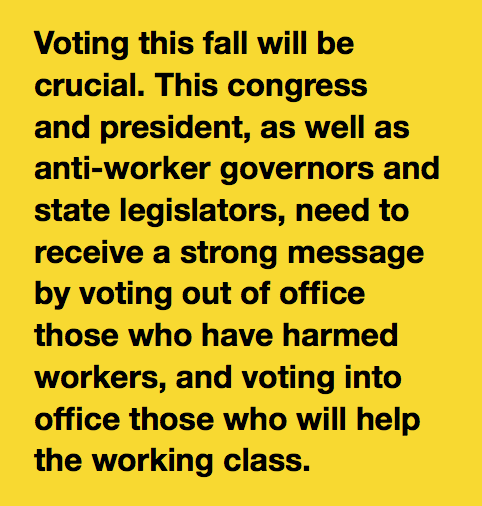Labor Rights are Human Rights
April 4, 2018 marked the 50th anniversary of the assassination of Rev. Dr. Martin Luther King, Jr. While it is well known that Dr. King’s assassination took place in Memphis, most Americans are not aware of the fact that he went to Memphis in support of striking sanitation workers. The strike began on February 12, when 1,300 black sanitation workers, fed up with unsafe working conditions, poor pay, and racism, walked off the job.
The incident that pushed the workers to their limit was the death of Echol Cole and Robert Walker. Cole and Walker, seeking shelter from the rain, went into the back of their truck and, when the compactor blade turned on, they were crushed to death. When the incident was reported, the city did nothing about it. The families of the workers received no monetary compensation.
Are we going backwards?
King’s assassination on April 4 only intensified the strike. Then, on April 16, 65 days after the strike began, a settlement was reached between the city and the workers. The settlement included much needed wage increases, new safety standards, and equal opportunity for black workers in supervising positions. This meant recognition of AFSCME Local 1733 and the first collective bargaining agreement ever signed by the City of Memphis.
 Now, 50 years later, we look at how far we have come since then. When we look at events since 2010, it can easily be said that we are going backward. That year brought with it a wave of newly elected conservative Republican legislators and governors. Shortly after that election, a major assault on organized labor began in states in which no one ever thought that could happen. States like Wisconsin, Michigan and Ohio saw viciously anti-union legislation passed. While voters in Ohio were able to beat back the legislation that was passed there via petition and ballot referendum, Wisconsin and Michigan had to deal with the passage of so-called Right-to-Work laws, the prohibition of dues check-off for public sector workers, and, in Wisconsin, the requirement to annually hold a recertification vote in which members that don’t vote have their vote counted as a “no” vote against the union.
Now, 50 years later, we look at how far we have come since then. When we look at events since 2010, it can easily be said that we are going backward. That year brought with it a wave of newly elected conservative Republican legislators and governors. Shortly after that election, a major assault on organized labor began in states in which no one ever thought that could happen. States like Wisconsin, Michigan and Ohio saw viciously anti-union legislation passed. While voters in Ohio were able to beat back the legislation that was passed there via petition and ballot referendum, Wisconsin and Michigan had to deal with the passage of so-called Right-to-Work laws, the prohibition of dues check-off for public sector workers, and, in Wisconsin, the requirement to annually hold a recertification vote in which members that don’t vote have their vote counted as a “no” vote against the union.
Workers on the federal level were also attacked by Republicans in the U.S. House of Representatives. There was an attempt to roll into a Federal Aviation Administration reauthorization bill the requirement that workers covered under the Railway Labor Act who abstain from unionization elections, would be counted as a “no” vote against the union.
The assault on democracy didn’t stop with unions, it also spread out to the general public. The tightening of voter ID laws was argued as a cure for voter fraud which is so rare it’s virtually non-existent. Certainly there is no legitimate argument that can be made in support of restricting or eliminating early voting, same day registration, Sunday voting, and placing restrictions on absentee ballots.
Trump Excutive Orders hurt workers
Now the most recent attack on workers comes from President Trump in the form of executive orders. The signing of executive orders, something for which Trump criticized Obama, is now something Trump does on a regular basis. The American Federation of Government Employees (AFGE) has over 700,000 members. Their President, J. David Cox was quoted as saying, “These executive orders strip agencies of their right to bargain terms and conditions of employment and replace it with a politically charged scheme to fire employees without due process.”
The Supreme Court is expected to soon issue a ruling in Janus v. AFSCME Council 31, a political attack on working people aimed at taking away the freedom to join together in strong unions and further rigging our economy and democracy in favor of corporations and billionaires.
Voting this fall will be crucial. This congress and president, as well as anti-worker governors and state legislators, need to receive a strong message by voting out of office those who have harmed workers, and voting into office those who will help the working class.

